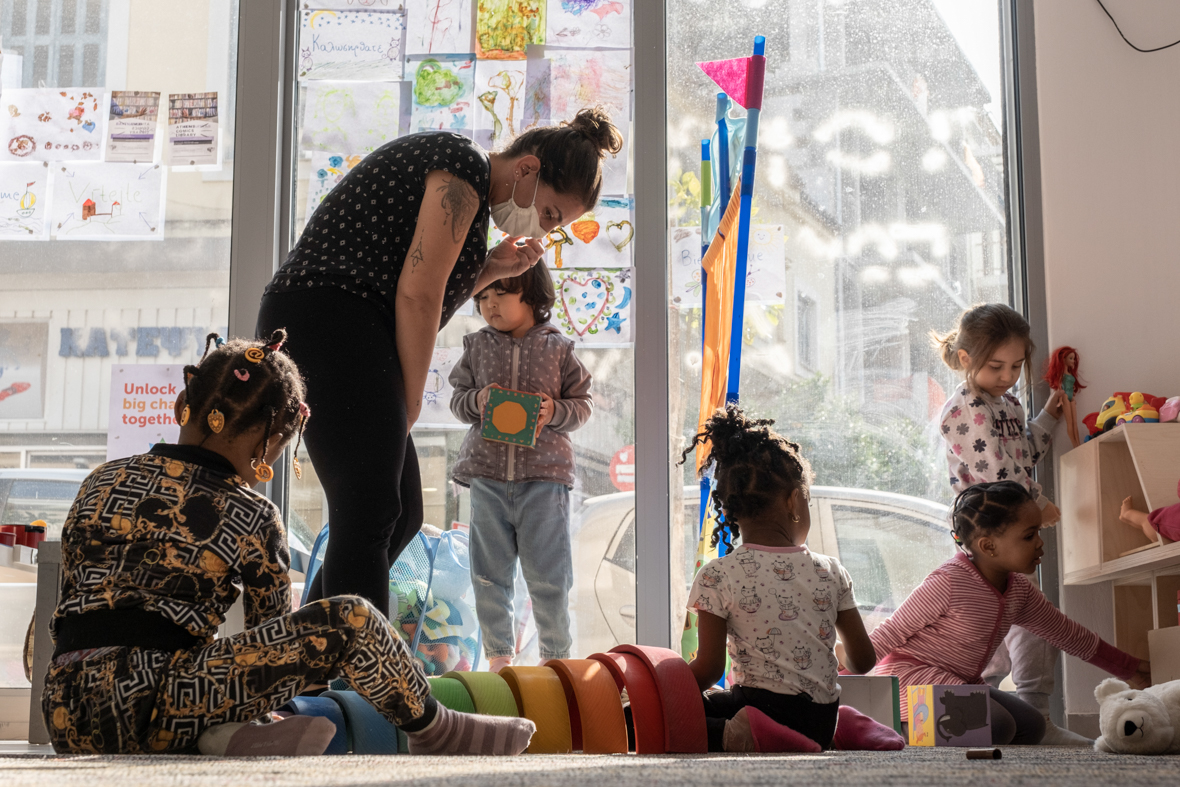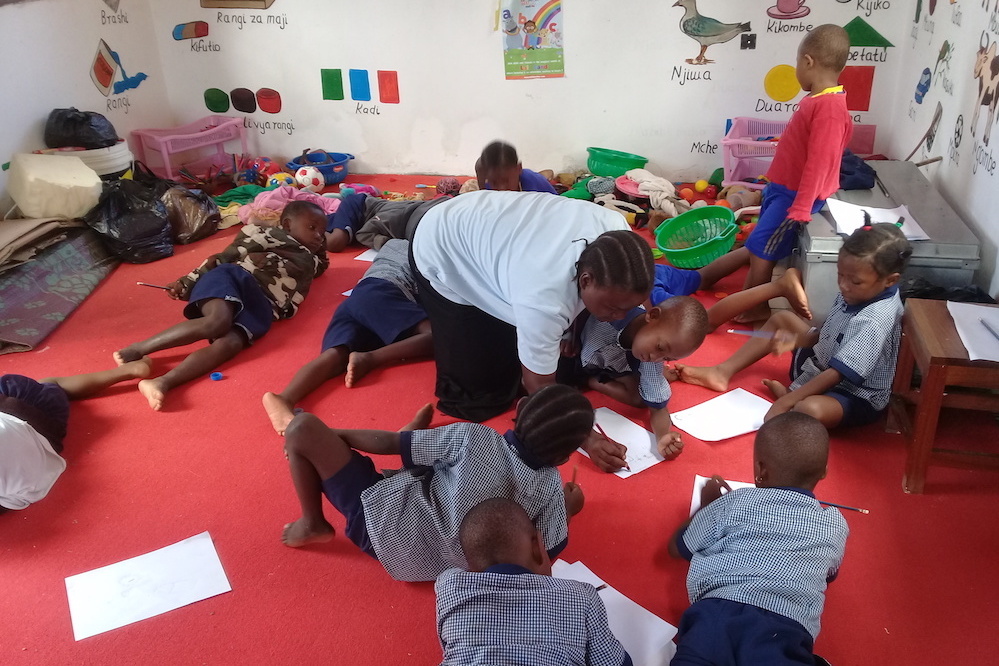
Play Labs help young children in Tanzania to learn while having lots of fun
Childcare, Early childhood development, Teachers and learning
More than 2400 of the poorest children are enrolled in the project run by BRAC, which enables them to develop, acquire skills and become better prepared for school.
Thousands of very poor and marginalised young children are getting a pre-school education – thanks to Play Labs set up by the charity BRAC in Tanzania.
The play labs are like nurseries, where children aged three to five attend for three hours every day. There they learn about health, mathematics, arts and science.
Early childhood development expert Janeth Malela is the project manager of the Play Labs. She spoke to Theirworld this week from Tanzania about what BRAC is trying to achieve with this kind of project and outlined the progress being made for some of the poorest young children in the region.
She explained: “Our Play Labs project has been going since 2016 and covers two regions – Mbeya and Temeke. They have been set up to directly help pre-school children and their parents.
“The aim of the Play Labs is to make children participate in early learning activities in learning environments and to develop their cognitive, emotional, linguistic and numerical capabilities. They learn to communicate, socialise and become better prepared for school.
“It’s a space to play, to develop their language and games and improve their learning. We undertake a 10-month activity and follow a specific curriculum.”
Theirworld’s #5for5 campaign is calling on the international community to invest in early childhood development. All children need access to quality care including nutrition, health, learning, play and protection.
World leaders are meeting in Germany in July at the G20 Summit to agree their priorities and what they should fund. We need them to prioritise the early years and especially pre-primary education, especially for the poorest and most marginalised children.
That’s exactly what is being delivered by BRAC, the world’s largest development organisation that is dedicated to empowering people living in poverty. The Bangladesh-based NGO operates across 11 countries, touching the lives of one in every 55 people.
BRAC’s education programme has become the largest secular and private education system in Tanzania, reaching a number of regions.
There are 2400 young children enrolled in 80 Play Labs across Tanzania, involving more than 2000 parents and caregivers.
Janeth said: “Many of the parents really appreciate what we are doing at the Play Labs. A lot of the children don’t want to go home when the classes are over, they love it so much.
“And the parents tell us that the children are talking more and playing more. They are singing to them and drawing, the parents feel their children are interacting more.
“The parents also feel their children are getting a good start and can see the growth in their children. We already feel it’s working for everyone involved.
“During our classes, we have ‘corners’. We have one corner for imagination, for innovation and creativity, where we use materials that are local – materials from the surrounding community as this is cost-effective.
“We have music corners where the children can play with drums and guitars and can discover their talent.

“And the parents tell us that the children are talking more and playing more. They are singing to them and drawing, the parents feel their children are interacting more.
“The parents also feel their children are getting a good start and can see the growth in their children. We already feel it’s working for everyone involved.
“During our classes, we have ‘corners’. We have one corner for imagination, for innovation and creativity, where we use materials that are local – materials from the surrounding community as this is cost-effective.
“We have music corners where the children can play with drums and guitars and can discover their talent.
“The story corner where they can read or draw pictures – and then the outdoor corner where they have free play for running about, playing jumping rope.”
In Tanzania, around 30% of children from poor families transition from pre-primary school but fail to complete primary school.
So when BRAC started receiving requests from communities to provide education for their children, it responded by opening 50 community-based pre-primary schools in 18 branches reaching 1500 students under the age of four in Iringa, Mbeya, Dar es Salaam and Dodoma.
Of course, funding and investment is always going to be a challenge. The Play Labs are funded by the LEGO Foundation.
Play Lab leaders tend to be volunteers who are given short training (10-day) courses about what is expected at the labs in terms of the curriculum, guidelines and learning material.
The Play Labs project also runs two active cohort studies to see what effect the labs are having on the children who go there.
Janeth worked with Care International, the malaria project for Save the Children and Plan International before joining BRAC, She is currently finishing her Masters degree in public health and has a wide knowledge of the region and early childhood development.
A chance to learn and develop - to grow and be creative. That’s what play labs in Tanzania are all about. Janeth Malela, BRAC Project Manager of the national play labs programme
She is delighted the results of the Play Labs can now be studied first-hand.
She said: “We want to be able to make the comparison from children involved in the play labs and those who are not and see what the difference in terms of their development.
“As it is now well documented, a child’s brain is still developing rapidly during these years, so it is essential that children get the chance of and access to this kind of stimulation.”
A child’s brain is 90% developed by the age of five – so this kind of approach is essential to improving the future potential of generations to come.
In Tanzania, the net enrolment rate of pre-primary school children aged five and six is reported to be 33% – lower than the average in most developing countries.
The hope is that the launch of the Play Labs will help to increase the number enrolling in pre-primary and then completing primary school.
But in the meantime, the children are having fun and learning.
“The Play Labs have indoor and outdoor activities every day from 8am to 11am,” said Janeth.
“The indoor activities are things like story time, arts and drawing, colouring-in on paper, singing songs about our subjects.
“For instance, we will sing about washing our faces (promoting health), songs counting out numbers (maths), songs about recognising animals (science).
“The outdoor activities are things like playing at a basin with sand or stones, making a little garden with flowers or running around. This is their free space.
“This new approach for early childhood development also stimulates play at home. The age group of children between two and three is so important when it comes to brain development – it is essential that we concentrate on the young children.
“And it’s very nice for us to see how much the children enjoy it too.”

More news

Take the test and discover how our Schools Hub helps students grasp the global education crisis
